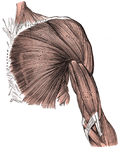Reverse shoulder replacement
Reverse Shoulder Replacement is a type of shoulder arthroplasty that involves a surgical procedure to replace the damaged parts of the shoulder joint with artificial components. This procedure is called "reverse" because it swaps the natural positions of the shoulder's ball and socket. Unlike traditional shoulder replacement surgery, where the artificial ball is attached to the shoulder bone and the socket is placed in the shoulder blade, reverse shoulder replacement attaches the artificial ball to the shoulder blade and the socket to the upper part of the arm bone. This design is particularly beneficial for patients with complex shoulder conditions, such as cuff tear arthropathy, a condition where severe rotator cuff tears have led to arthritis of the shoulder, or for those who have had previous unsuccessful shoulder surgeries.
Indications
Reverse shoulder replacement is indicated for individuals with:
- Severe shoulder arthritis combined with a large rotator cuff tear.
- A previously failed shoulder replacement.
- Complex fractures of the shoulder joint.
- Severe shoulder pain and difficulty lifting the arm away from the side or overhead, which significantly affects daily activities.
- Cuff tear arthropathy.
- Massive, irreparable rotator cuff tears without arthritis.
Procedure
The surgery is performed under general anesthesia. The surgeon makes an incision over the shoulder to expose the shoulder joint. The damaged bone and cartilage are removed, and the positions of the shoulder's ball and socket are reversed in their placement. The artificial socket is attached to the upper part of the humerus (arm bone), and the artificial ball is attached to the shoulder blade. This configuration allows the deltoid muscle, rather than the damaged rotator cuff, to lift the arm.
Recovery
Post-surgery, patients typically wear a sling for 4 to 6 weeks and undergo physical therapy to regain movement and strength. Full recovery and maximum benefit from the surgery may take several months. The success of the surgery largely depends on the patient's adherence to the rehabilitation protocol.
Risks and Complications
As with any major surgery, reverse shoulder replacement carries risks, including infection, nerve injury, and dislocation of the artificial components. However, the incidence of these complications is relatively low.
Benefits
The primary benefit of reverse shoulder replacement is the significant reduction in shoulder pain and improvement in arm function, especially in lifting the arm overhead. This surgery allows patients who have had little to no shoulder function due to complex conditions to regain significant function and quality of life.
Transform your life with W8MD's budget GLP-1 injections from $125.
W8MD offers a medical weight loss program to lose weight in Philadelphia. Our physician-supervised medical weight loss provides:
- Most insurances accepted or discounted self-pay rates. We will obtain insurance prior authorizations if needed.
- Generic GLP1 weight loss injections from $125 for the starting dose.
- Also offer prescription weight loss medications including Phentermine, Qsymia, Diethylpropion, Contrave etc.
NYC weight loss doctor appointments
Start your NYC weight loss journey today at our NYC medical weight loss and Philadelphia medical weight loss clinics.
- Call 718-946-5500 to lose weight in NYC or for medical weight loss in Philadelphia 215-676-2334.
- Tags:NYC medical weight loss, Philadelphia lose weight Zepbound NYC, Budget GLP1 weight loss injections, Wegovy Philadelphia, Wegovy NYC, Philadelphia medical weight loss, Brookly weight loss and Wegovy NYC
|
WikiMD's Wellness Encyclopedia |
| Let Food Be Thy Medicine Medicine Thy Food - Hippocrates |
Medical Disclaimer: WikiMD is not a substitute for professional medical advice. The information on WikiMD is provided as an information resource only, may be incorrect, outdated or misleading, and is not to be used or relied on for any diagnostic or treatment purposes. Please consult your health care provider before making any healthcare decisions or for guidance about a specific medical condition. WikiMD expressly disclaims responsibility, and shall have no liability, for any damages, loss, injury, or liability whatsoever suffered as a result of your reliance on the information contained in this site. By visiting this site you agree to the foregoing terms and conditions, which may from time to time be changed or supplemented by WikiMD. If you do not agree to the foregoing terms and conditions, you should not enter or use this site. See full disclaimer.
Credits:Most images are courtesy of Wikimedia commons, and templates, categories Wikipedia, licensed under CC BY SA or similar.
Contributors: Prab R. Tumpati, MD


